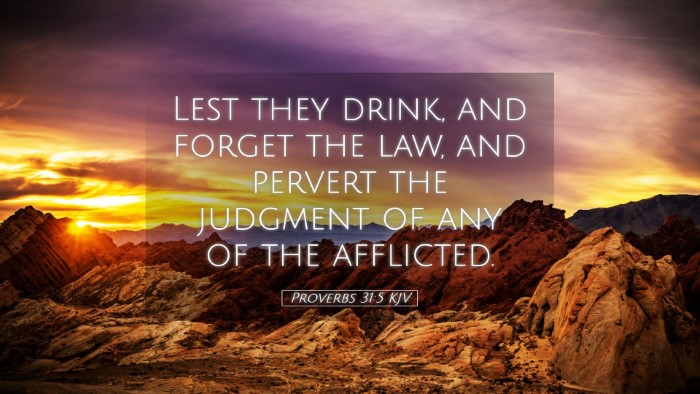Commentary on Proverbs 31:5
Proverbs 31:5 states: "Lest they drink and forget the law, and pervert the judgment of any of the afflicted." This verse, part of King Lemuel's advice concerning the qualities of a virtuous woman, provides profound insight into the hazards of alcohol and its impact on judgment and righteousness.
Contextual Overview
This verse falls within the broader section of Proverbs that extols the virtues of a wise and capable woman. The passage illustrates the attributes of one who fears the Lord and conducts herself with wisdom and kindness. Against this backdrop, verse 5 introduces a stern warning aimed, in part, at kings and rulers, cautioning them regarding the dangers of intoxication and its potential to distort justice.
Insights from Matthew Henry
Matthew Henry emphasizes the significant responsibility of leaders and the consequences of neglecting their duties. He articulates that when leaders indulge in strong drink, they not only jeopardize their own integrity but also undermine the principles of justice. Alcohol has a way of clouding judgment and can lead to a perversion of equitable decisions. Henry notes that the "law" refers to not only God's commandments but also to the principles of fair judgment.
Key Takeaways from Henry
- Leaders Must Exercise Discernment: The actions of rulers affect the people they govern.
- The Dangers of Intoxication: Alcohol impairs the ability to make sound judgments.
- Concern for the Afflicted: The verse highlights the importance of considering the plight of the oppressed in decision-making.
Insights from Albert Barnes
Albert Barnes provides a succinct exposition on the impending dangers of alcohol, particularly for those in positions of authority. He emphasizes that the consumption of wine or strong drink leads to forgetfulness—not of mundane matters but of vital statutes which govern moral conduct and justice. Barnes further connects this forgetfulness to the perversion of justice, noting that the drunkard often neglects the needs of the impoverished and marginalized.
Key Takeaways from Barnes
- Impact on Memory: Intoxication leads to a forgetful state where the core tenets of faith and duty are lost.
- Neglect of Justice: Rulers should be aware of their impact on society, especially towards the weak.
- Holistic Leadership: True leadership involves not merely rule but care and compassion for all, especially the afflicted.
Insights from Adam Clarke
Adam Clarke's commentary delves into the societal implications of this verse, stressing that the forgetfulness induced by wine leads not only to personal folly but also to broader social injustices. Clarke suggests that this scripture serves as a warning—especially to kings and those in power—about the moral duties that accompany their positions. He highlights that true leaders are those who are firm in their principles, ensuring that their judgments are just and true.
Key Takeaways from Clarke
- Societal Leadership: Responsibilities extend beyond individual judgment to the overall societal well-being.
- Call to Righteousness: Leaders are urged to maintain sobriety to ensure their judgments are fair.
- Awareness of Consequences: Leaders must realize that their indulgences can have far-reaching implications.
Theological Implications
Proverbs 31:5 stands as a significant theological statement about the nature of leadership, personal moral integrity, and societal responsibility. For pastors and theologians, this verse provides a clear directive: leaders, both in spiritual and secular spheres, must exhibit temperance to fulfill their God-given responsibilities. The dangers of alcohol not only affect personal judgment but also the welfare of the community at large.
Application for Pastoral Ministry
- Teaching on Sobriety: Pastors can use this verse to stress the importance of temperance in their own lives and in the lives of their congregation.
- Promoting Justice: The church is called to advocate for the marginalized and remind leaders of their responsibilities towards them.
- Prayer for Leaders: Encourage the congregation to pray for discernment and integrity in those who hold positions of authority.
Reflection for Students and Scholars
- Exegesis of Leadership: Scholars can explore the cultural and historical contexts surrounding Proverbs 31 and its instruction to leaders.
- Ethical Consideration: Consider modern applications of this text concerning leadership ethics, particularly in contexts where moral failings lead to societal harm.
- The Role of the Church: Investigate how the church can function as an entity that promotes moral integrity in public life.
Conclusion
Proverbs 31:5 serves as a timeless reminder of the ethical responsibilities borne by those in leadership and the dire consequences that can arise from moral failings, particularly in relation to the effects of alcohol on judgment. Drawing insights from Matthew Henry, Albert Barnes, and Adam Clarke enriches our understanding, confirming that sound leadership is predicated not only on wisdom but also on justice, care for the afflicted, and the exercise of personal restraint. As we reflect on this passage, may we affirm the call to integrity and compassion, embodying the principles of righteous leadership in all aspects of life.


